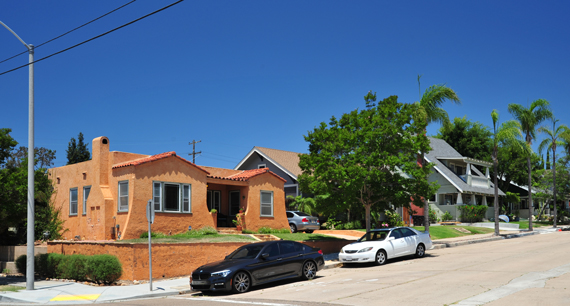|
The Mills Act, the Missing Middle and Affordable Housing
By Bruce Coons
SOHO Executive Director
November/December 2023
Despite the considerable rhetoric about making housing more affordable, the Mills Act remains San Diego’s sole effective incentive that makes houses more affordable.
Named after the late San Diegan James Mills, our former State Senator and a great friend of preservation, the Mills Act offers a compelling incentive to owners of designated historic properties in California. In exchange for taking on the responsibility of preserving, maintaining, and restoring these historic landmarks for public benefit, they may receive a reduction in property taxes. Beyond its cultural and aesthetic impact, the Mills Act also addresses a pressing concern in San Diego: the need for affordable housing.
Unlocking middle-class homeownership in a city where real estate prices are out of reach for the average homeowner, the Mills Act provides a lifeline. While it is true that owners of grand estates can benefit from the program, the heart of the Mills Act's impact lies in its support for middle-class homeowners. These are individuals and families who might not be able to shoulder the burden of fully taxed historic homes. The Act's provisions for property tax reduction offer some effective relief, making it feasible for regular working citizens to own and maintain pieces of the city's history.
 Affordable housing doesn't always equate to low-income housing, though the Mills Act, if offered and promoted more effectively can and will make a major positive impact in significantly reducing the cost of housing for low income families. San Diego's high-rent real estate market challenges the notion of affordability and demands innovative approaches to ensure affordability across different income brackets. The Mills Act champions this cause by offering middle-class homeowners an opportunity to participate in preserving the city's heritage without succumbing to exorbitant property taxes.
Affordable housing doesn't always equate to low-income housing, though the Mills Act, if offered and promoted more effectively can and will make a major positive impact in significantly reducing the cost of housing for low income families. San Diego's high-rent real estate market challenges the notion of affordability and demands innovative approaches to ensure affordability across different income brackets. The Mills Act champions this cause by offering middle-class homeowners an opportunity to participate in preserving the city's heritage without succumbing to exorbitant property taxes.
The Mills Act doesn't just save individual houses; it also safeguards the character and essence of San Diego's historic neighborhoods. This preservation effort combats the trend of vapid development that can easily erode a community’s prized fabric. By encouraging homeowners to invest in the upkeep of historic properties, the Mills Act fosters a sense of pride and belonging, anchoring families within the city's diverse neighborhoods.
The program's accessibility extends beyond tax incentives. The qualifying criteria, including significant architecture, historical associations to people and events, and location within historic districts, reflect the varied range of properties that can benefit. Furthermore, the fact that the contract is tied to the property, not the owner, ensures continuity even through property sales.
As of now, approximately 1,600 properties or fewer in all of San Diego County are benefiting from the Mills Act. This number isn't just a statistic; it represents families, individuals, and communities whose lives are positively impacted by the ability to own and maintain historic homes. These owners are also safeguarding our shared architectural and cultural heritage.
In a city grappling with the challenges of rapid urbanization and soaring real estate prices, the Mills Act emerges as a champion for middle-class homeownership and historic preservation, both of which benefit us all.
|
2025
2024
2023
2022
2021
2020
2019
2018
2017
2016
2015
|




